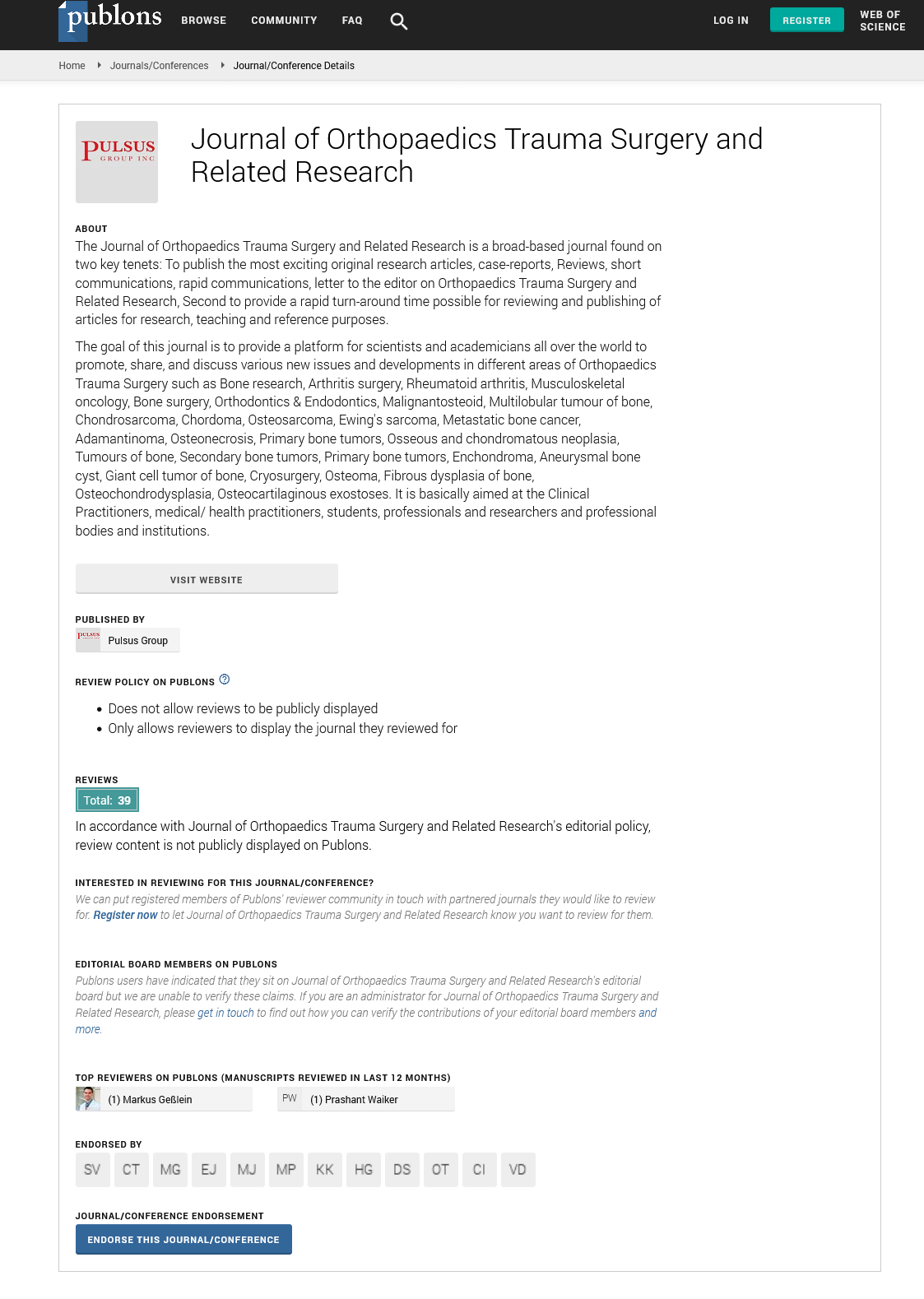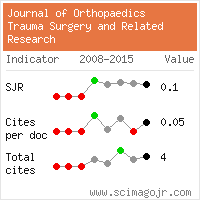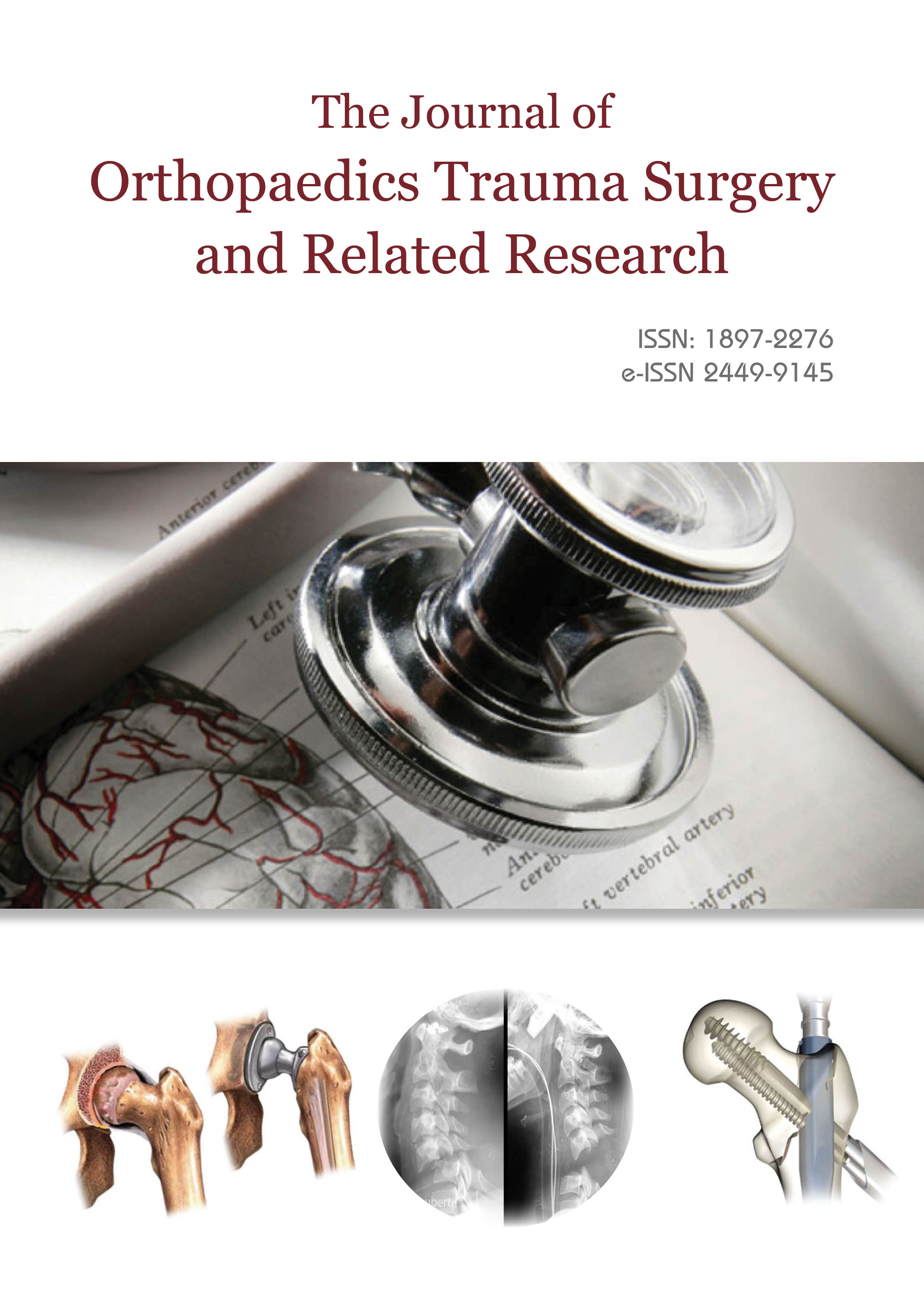Ways artificial intelligence can be used to improve patient outcomes in orthopaedic surgery
2 Baylor College of Medicine Joseph Barnhart Department of Orthopedic Surgery, Texas, USA
Received: 28-Jul-2023, Manuscript No. jotsrr-23- 108434; Editor assigned: 31-Jul-2023, Pre QC No. jotsrr-23-108434 (PQ); Accepted Date: Aug 20, 2023 ; Reviewed: 15-Aug-2023 QC No. jotsrr-23-108434 (Q); Revised: 18-Aug-2023, Manuscript No. jotsrr-23-108434 (R); Published: 23-Aug-2023
This open-access article is distributed under the terms of the Creative Commons Attribution Non-Commercial License (CC BY-NC) (http://creativecommons.org/licenses/by-nc/4.0/), which permits reuse, distribution and reproduction of the article, provided that the original work is properly cited and the reuse is restricted to noncommercial purposes. For commercial reuse, contact reprints@pulsus.com
Abstract
Artificial Intelligence (AI) is a powerful tool that orthopaedic surgeons can use to augment patient care and treat a variety of conditions. AI can greatly assist orthopaedic surgeons at each stage of care, from preoperative planning and consultations to surgical navigation and post-operative management. This short communication delves into each of these stages of patient care and covers examples of how AI can be implemented to better orthopaedic care. We then briefly mention some existing and potential challenges that must be addressed before AI can be used on a wide scale in orthopaedics.
Keywords
Artificial intelligence, predictive modeling, surgical navigation, postoperative monitoring, preoperative planning, machine learning
Introduction
Artificial Intelligence (AI) has revolutionized various fields including healthcare. Within medicine, orthopaedic surgery can greatly benefit from AI. AI can be leveraged in orthopaedic surgery in various ways, including
1. preoperative planning,
2. surgical navigation,
3. postoperative monitoring, and
4. predictive modeling.
AI can enhance the accuracy and efficiency of pre-operative planning [1]. With the help of AI algorithms, surgeons can create detailed 3D models of a patient’s anatomy based on X-Rays, CT scans, or MRI scans [2]. These models can provide a more comprehensive understanding of the patient’s condition and allow surgeons to plan surgeries with greater precision [2]. Furthermore, AI can help select the best implant for a particular patient, such as the need for augmentation to account for bone loss. It can further analyze a patient’s medical history, lifestyle, and other factors to suggest the optimal implant for the patient, reducing the risk of complications and improving outcomes [3].
Surgical navigation is another area where AI can be used to improve the accuracy and reproducibility of orthopaedic surgery. Surgical navigation systems can use advanced imaging technologies and tracking systems to guide surgeons during surgeries [4]. By integrating AI algorithms into these systems, surgeons can receive real-time feedback on their performance, allowing them to adjust their approach and minimize the risk of errors. AI can also provide personalized guidance to surgeons based on a patient’s unique anatomy, potentially improving the outcome of that surgical procedure for that patient [5]. AI can also simulate surgical procedures, allowing surgeons to test new techniques and refine their skills without putting the patients at risk [6]. This modality can further serve as a teaching tool for surgical trainees in preparation for an upcoming procedure.
Postoperative monitoring is critical for ensuring the success of orthopaedic surgery, and AI can play a crucial role in this regard. By analyzing patient data, such as vital signs, pain levels, and mobility, AI can provide early warning signs of potential complications, allowing healthcare providers to intervene quickly and prevent further damage [1]. AI can help predict a patient’s recovery time and develop personalized rehabilitation plans based on their unique needs and abilities.
In addition to these areas, AI can also assist orthopaedic surgeons in predicting surgical outcomes within a diverse patient population. As the volume of data accessible from electronic medical records continues to increase, AI via machine learning algorithms can analyze this information and identify patterns that physicians may overlook. For example, machine learning models have been shown to accurately predict improvement following shoulder replacement for glenohumeral osteoarthritis by integrating information about morphological features, functional status, age, and sex [7]. These predictions can assist physicians in managing patient expectations during preoperative counseling, ultimately improving patient satisfaction [7].
Although AI has demonstrated early potential in orthopaedic surgery, there are also some challenges that need to be addressed. One of the main challenges is ensuring the accuracy and reliability of the AI algorithms. To achieve this, AI algorithms must be thoroughly tested and validated using large datasets and rigorous statistical methods. Another challenge is understanding the ethical and legal implications of AI in healthcare. As AI becomes more prevalent in healthcare, it is essential to develop policies and regulations to ensure patient privacy, security, and informed consent. In addition, the expertise needed to manage the complexities of AI such as machine learning programming may be beyond the scope of many orthopaedic surgeons, requiring multi-disciplinary training and teamwork.
AI has the potential to benefit orthopaedic surgeons and patients by improving the accuracy and precision of surgical procedures, enhancing preoperative planning, providing personalized postoperative care, and predicting surgical outcomes. While there are challenges that need to be addressed, the benefits of AI in orthopaedic surgery are significant and have the potential to improve patient outcomes and quality of life.
References
- Loftus TJ, Tighe PJ, Filiberto AC, et al. Artificial Intelligence and Surgical Decision-making. JAMA Surg. 2020;155:148–58.. [Google Scholar] [Cross ref]
- Shujaat S, Riaz M, and Jacobs R. Synergy between artificial intelligence and precision medicine for computer-assisted oral and maxillofacial surgical planning. Clinical Oral Investigations. 2023 Mar;27(3):897-906. [Google Scholar] [Cross ref]
- Hui AT, Alvandi LM, Eleswarapu AS, et al. Artificial Intelligence in Modern Orthopaedics: Current and Future Applications. JBJS reviews. 2022 Oct 1;10(10):e22. [Google Scholar] [Cross ref]
- Liu Y, Tang P. The prospect for the application of the surgical navigation system based on artificial intelligence and augmented reality. IEEE international conference on artificial intelligence and virtual reality (AIVR) 2018 Dec 10 (pp. 244-246). IEEE. [Google Scholar] [Cross ref]
- Siemionow KB, Katchko KM, Lewicki P, et al. Augmented reality and artificial intelligence-assisted surgical navigation: Technique and cadaveric feasibility study. J. Craniovertebral Junction Spine 2020;11(2):81. [Google Scholar] [Cross ref]
- Turner AE, Abu-Ghname A, Davis MJ, et al. Role of Simulation and Artificial Intelligence in Plastic Surgery Training. Plastic and Reconstructive Surgery. 2020 ;146(3):390e-1e. [Google Scholar] [Cross ref]
- McLendon PB, Christmas KN, Simon P, et al. Machine learning can predict level of improvement in shoulder arthroplasty. JBJS Open Access. 2021; 6(1). [Google Scholar] [Cross ref]



 Journal of Orthopaedics Trauma Surgery and Related Research a publication of Polish Society, is a peer-reviewed online journal with quaterly print on demand compilation of issues published.
Journal of Orthopaedics Trauma Surgery and Related Research a publication of Polish Society, is a peer-reviewed online journal with quaterly print on demand compilation of issues published.